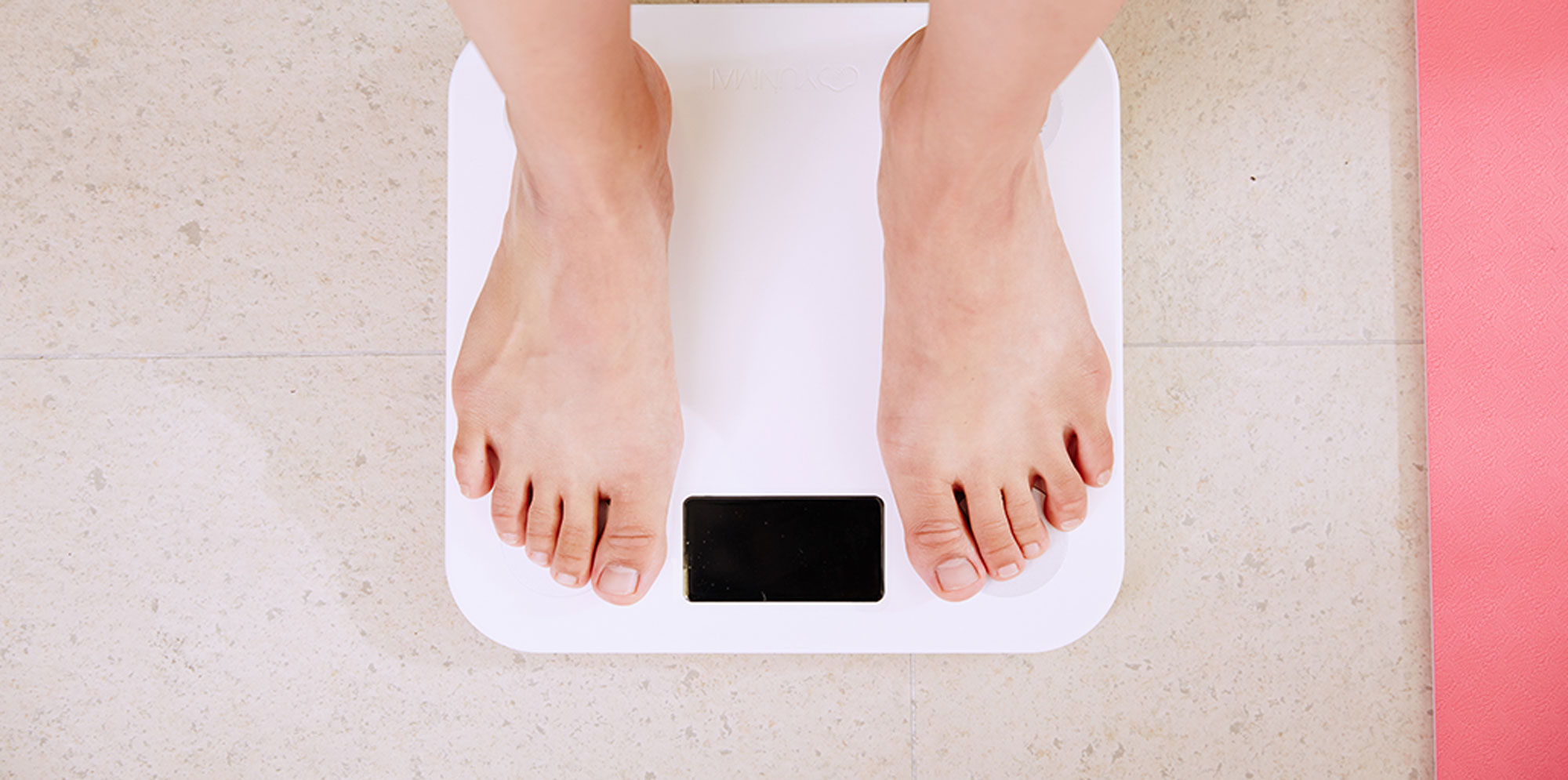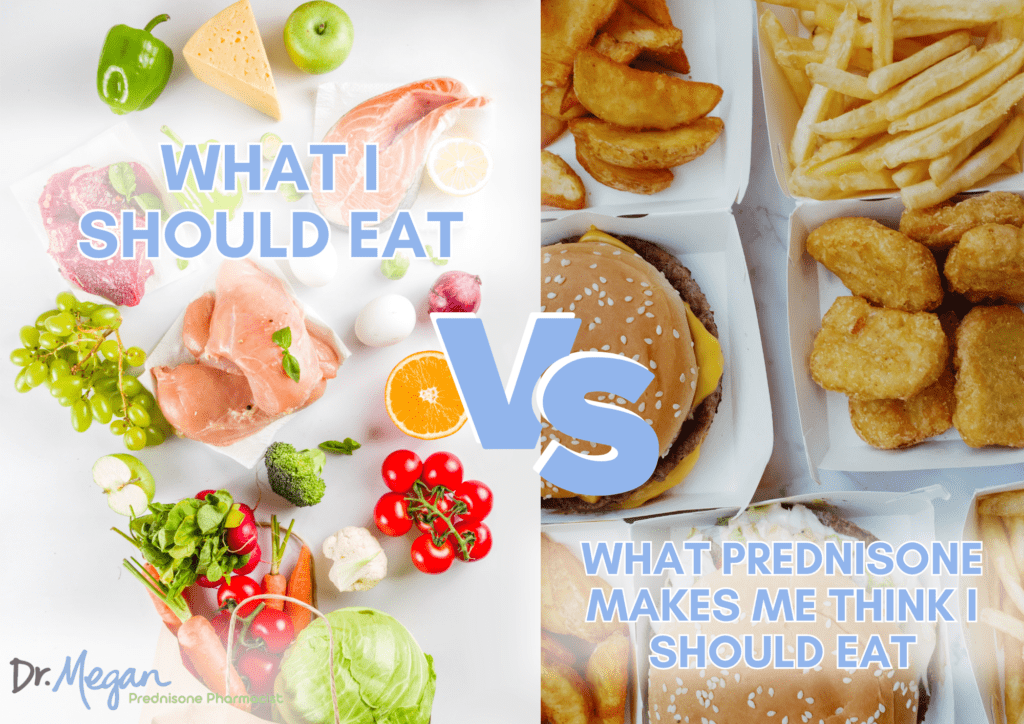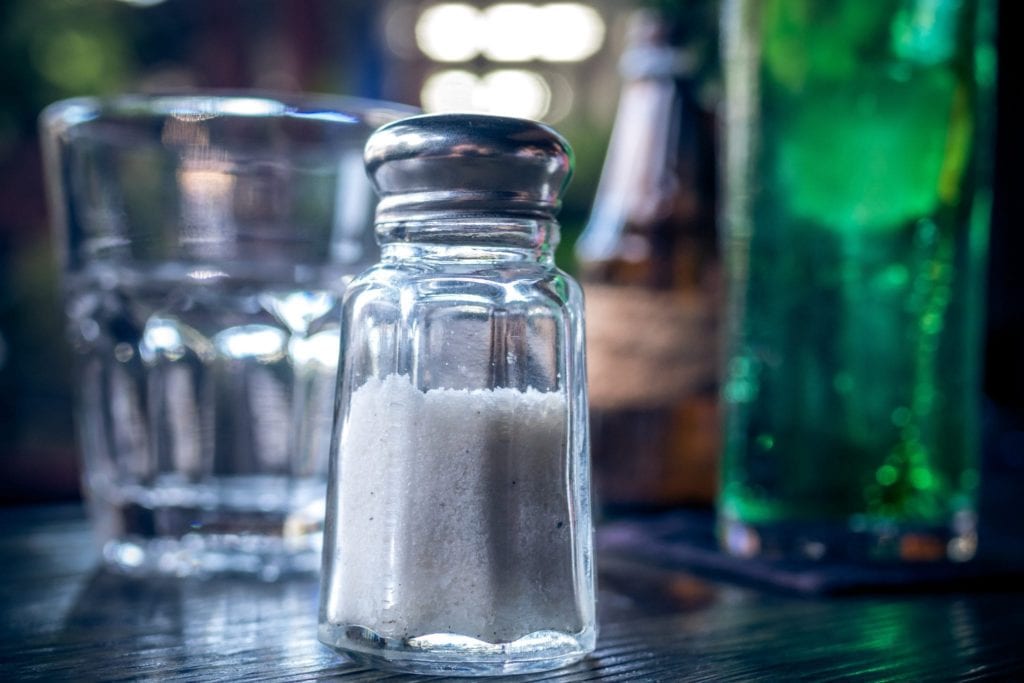Prednisone Weight Gain

Over half of the prednisone users I surveyed stated that their #1 concern while taking prednisone is weight gain. Larger studies show 70% of prednisone users gain weight.
Watch the video or enjoy reading further below.
Watch now!
Does prednisone make you gain weight?
Yes! Weight gain is one of the most common side effects of prednisone.
How much weight is common?
For people using low dose prednisone (5-10 mg per day) over 2 years, they gained 4-8% of their baseline body weight. This means a previously 120-pound person gains 5-10 pounds. Doses of prednisone under 5 mg are unlikely to case weight gain.
When do I gain weight? How long does it take?
The longer time you take prednisone, the more likely you are to gain weight. Surprisingly, in the first few weeks, it’s possible to lose weight because prednisone causes lipolysis, a breakdown of fat cells, at first. Later, prednisone causes the opposite effect and makes fat cells enlarge.
Will I gain weight if I only take prednisone short-term?
Taking prednisone less than seven days does not have much of an impact on body weight. Long-term therapy causes significant weight gain.
What about Prednisone “Moon Face”?
Your face swells into a round shape like the moon as the dose goes up. This means that at low doses, moon face is uncommon. At high doses of prednisone, such as 60 mg, most people’s faces will round out. Moon face slowly goes away as you slowly taper off prednisone. Within two weeks or so of stopping prednisone, most people report that moon face has completely disappeared. Moon face is a symptom of Cushing’s Syndrome, the symptoms of high cortisol. Moon face is one of the ways that prednisone redistributes fat:
- Moon Face: round face
- Buffalo Hump: fat on shoulder and neck area
- Belly Fat: even a man can look pregnant

How does prednisone cause weight gain?
High Cortisol
First, taking prednisone replaces the body’s natural hormone, cortisol.
Prednisone looks almost identical to cortisol, so the body is tricked into thinking they are the same.
Also, enzymes break down the prednisone so that it becomes even more similar to cortisol.
Cortisol is a hormone that keeps us alive by helping regulate our “fight or flight” reaction and does so through increasing the wear and tear.
If there is a tiger chasing you, you need a big jolt of energy to either run away, “flight,” or turn and “fight” the tiger.
Your body does whatever it can to give you that energy in the form of blood sugar. The liver releases sugar. Fat cells block the uptake of sugar. All this sugar allows your muscles to work fast to escape or fight back.
The problem is, when we are on prednisone, the tiger never goes away.
There is always some prednisone floating around making you still feel that stress, that feeling of “Oh my goodness, I’m about to be eaten!”
But we don’t have a real tiger chasing us, so the extra energy floating around our bodies as high blood sugar is not used.
High blood sugar leads to Fat
The energy storage hormone, insulin, sees this extra energy and signals the body to store the high blood sugar as fat.
- Liver goes into energy production mode and makes sugar
- Fat cells store extra sugar as fat
- Kidney pees extra sugar
High insulin makes us feel hungry. Plus prednisone gives us the “munchies” all on its own.

Prednisone Changes Metabolism
Prednisone hijacks normal signals in your metabolism to keep your weight normal. For example, leptin is the fullness hormone released by fat cells. Leptin tells you that you feel full and can stop eating. Somehow prednisone blocks the signals of leptin, so your normal feeling of hunger is missing. You can eat junk food until your stomach hurts in fullness, but you may not reach a point that you feel full.
Your body tries to compensate by releasing higher and higher amounts of leptin, but somewhere in the cascade of signals, it’s not being received. Having too high levels of leptin leads to leptin resistance, similar to insulin resistance, where even high levels no longer do the job. This leads to fat storage as well.
Muscle & Bone Loss
Prednisone breaks down bones, leading to bone loss and possibly osteoporosis. Prednisone also breaks down muscles, both of which lead to skinnier arms and legs despite a rounding belly and face. Bone mass and muscle mass contribute to the body’s overall lean body mass. The percent of lean body mass determines your resting metabolic rate which is the amount of calories you use while at rest. Since the lean body mass is going down, the amount of calories you normally use while sitting goes down.
Prednisone affects the salt balance of the body. Normally your kidneys keep a steady salt balance of sodium and potassium, which are opposites inside the body. Potassium is high inside cells, while sodium is high outside cells. Prednisone causes the kidneys to hold onto the sodium, which leads to potassium loss. High sodium causes bloating, water retention, and contributes to moon face.

Back to the “fight or flight” changes, prednisone makes it so that your tolerance level may decrease. For example, maybe you can normally tolerate someone cutting you off on the freeway. But on prednisone, your reaction is heightened, quicker, and possibly less reasonable. In scientific speak, there is less space for your prefrontal cortex to modulate your reaction.
Prednisone mood changes can possibly lead to less will power to deal with food, because you are using up all your will power to keep a steady mood. Personality changes can lead to less ability to resist binges. This means starving yourself is not a good idea while on prednisone. Keep a steady intake of healthful food so that you never get so hungry you’ll binge.
Prednisone use can lead to the #1 tweeted side effect, insomnia. Sleep is a very important time for keeping a regular metabolism. Fewer hormones released during sleep leads to fat storage. Less sleep leads to less will power to resist temptations.

So am I doomed?
Now that you understand how prednisone causes weight gain, you have the information you need to know which strategies could work and which do not work to keep off the weight. Focusing on eating high quality food low in refined sugar is the foundation of preventing prednisone weight gain. Use the prednisone appetite to eat foods rich in nutrients. Improving your sleep and exercising enough, but not too much, can also help keep off the pounds. The goal while taking prednisone should be to slow down or stop the weight gain, and not worry about losing weight. Dr. Megan is here to help guide you through this process.
Prednisone Weight Gain Articles – Learn More…
- Water Weight Gain – How Prednisone Causes It
- Foods to AVOID While on Prednisone to Prevent Prednisone Weight Gain
- 10 Nutrients You Need While on Prednisone
- 9+ Nutrients Depleted by Prednisone
- How to Eat the Nutrients You Need – Stop the Prednisone Weight Gain
- Consequences of Prednisone Weight Gain – Not Just the Belly!
- What I Wish I’d Known Before Taking Prednisone
- Prednisone Podcasts – How to Manage Weight on Steroids
- Embrace Moon Face
- Prednisone Cravings – How to Resist the Extreme Hunger
- ULTIMATE Diet Review for Prednisone
- Her Doctors Tried Everything…

